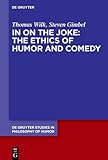In on the Joke: The Ethics of Humor and Comedy / Thomas Wilk, Steven Gimbel.
Material type: TextSeries: De Gruyter Studies in Philosophy of Humor ; 4Publisher: Berlin ; Boston : De Gruyter, [2024]Copyright date: 2024Description: 1 online resource (X, 144 p.)Content type:
TextSeries: De Gruyter Studies in Philosophy of Humor ; 4Publisher: Berlin ; Boston : De Gruyter, [2024]Copyright date: 2024Description: 1 online resource (X, 144 p.)Content type: - 9783110759754
- 9783110760026
- 9783110759853
- online - DeGruyter
- Issued also in print.
| Item type | Current library | Call number | URL | Status | Notes | Barcode | |
|---|---|---|---|---|---|---|---|
 eBook
eBook
|
Biblioteca "Angelicum" Pont. Univ. S.Tommaso d'Aquino Nuvola online | online - DeGruyter (Browse shelf(Opens below)) | Online access | Not for loan (Accesso limitato) | Accesso per gli utenti autorizzati / Access for authorized users | (dgr)9783110759853 |
Frontmatter -- Acknowledgments -- Contents -- Introduction. The Need for a Better Account of Joke Ethics -- Chapter 1: Das Capital: Joke Capital and Where to Get It -- Chapter 2: You Know Me Better Than That: Joking with Friends -- Chapter 3: We Hardly Knew Ye: Joking with Strangers -- Chapter 4: From Open Mics to Open Minds: Joking on Stage -- Chapter 5: Hey Boss, That’s Pretty Funny: Joking with Power -- Chapter 6: Putting the “Twit” in Twitter: Virtual Jokes -- Bibliography -- Index
restricted access online access with authorization star
http://purl.org/coar/access_right/c_16ec
Who is morally permitted to tell jokes about Jews? Poles? Women? Only those in the group? Only those who would be punching up? Anyone, since they are just jokes? All of the standard approaches are too broad or too narrow. In on the Joke provides a more sophisticated approach according to which each person possesses "joke capital" that can serve as "comic insurance" covering certain jokes in certain contexts. When Bob tells a joke about Jews, we can never know exactly what Bob is intending since we cannot see inside Bob’s mind. But we could reasonably infer, if we knew Bob himself was Jewish, if he worked tirelessly for Jewish causes, or was a card-carrying Neo-Nazi. Each would affect his joke capital, and, in certain circumstances, we would have a moral standing to demand to see his ledger to see how much joke capital he had with respect to Jews. The permissibility of that joke depends upon four factors: the joke, the teller of the joke, the audience, and the setting. The view developed in In on the Joke is the only view that clearly explains how each of these components work together in an integrated, effective ethic of humor.
Issued also in print.
Mode of access: Internet via World Wide Web.
In English.
Description based on online resource; title from PDF title page (publisher's Web site, viewed 20. Nov 2024)


